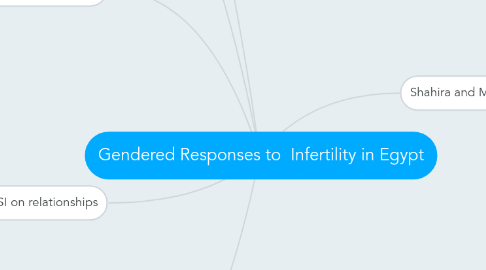
1. Emergence of ICSI on relationships
1.1. Enables male infertility to conceive
1.1.1. ICSI work well for male infertility. Egg is injected with sperm before being implanted in woman.
1.1.2. Infertile men must decide to preserve childless marriage or remarry.
1.1.2.1. Men are more likely to leave their wives because of childlessness than the reverse.
1.2. leaves aging women without an option
1.2.1. women stay with their infertile husbands through failed IVF treatments. Emergence of ICSI allows husbands to find new, younger wives
1.2.1.1. Many women shoulder the blame for childlessness, either wittingly or unwittingly.
1.2.1.2. Often more secure in their marriage
1.2.1.3. Woman wields additional power in relationship when she stays with infertile husband.
2. Marriage in Egypt
2.1. Highly valued
2.2. Singledom is socially penalized.
2.3. No Egyptian word for "couple".
2.3.1. Marriages are fragile until after childbirth is achieved
2.3.1.1. not common to postpone childbirth after marriage
2.4. Many marriages are arranged or semi-arranged.
2.4.1. love is supposed to emerge through childbirth and parenting of children.
2.5. Many infertile couples feel more conjugally connected.
2.5.1. Children do not come between them.
2.5.2. They look to each other for support and affection.
2.5.3. Many women shoulder the blame for childlessness, either wittingly or unwittingly.
3. Egyptian Desire to have Children
3.1. Fertility rate of 3.5
3.2. They emphatically love babies and children.
3.3. They deem motherhood to be a "natural" part of their lives
3.3.1. innate maternal instinct
3.3.2. part of their gender identiy
3.4. Men deemed weak and not masculine if infertile
3.4.1. Homosocially competitive of their hegemonic masculinities
4. Maisa and Ahmed
4.1. 39 and 46, respectively
4.1.1. childless for 17 years
4.2. In her, blocked fallopian tubes following unnecessary iatrogenic operation.
4.3. In him, poor sperm count and two unsuccessful surgeries on testicles.
4.4. Succeeded in becoming pregnant on 2nd treatment of ICSI but lost fetus after first trimester
4.5. Never revealed to family members or friends that they were attempting IVF
4.5.1. embarrassed of stigma attached
5. Social Stigma of IVF
5.1. double stigma
5.1.1. treatment to overcome stigmatized health condition leads to additional secrecy, stigma, and suffering.
6. Shahira and Moustafa
6.1. 25 and 43 yrs old, respectively
6.1.1. wealthy lawyer
6.2. His second wife
6.2.1. divorced first wife of 17 years because they were childless
6.2.2. early on in first marriage, he was told by a doctor that he was infertile
6.2.3. first wife tried IVF numerous times
6.3. She knew about his infertility problems when they married
6.3.1. she accepts his infertility but is also willing to try IVF for him
6.3.2. She is afraid of IVF but did it for him
6.4. pregnant with twins from ICSI
6.4.1. He lets people think his childless first marriage was the problem of his first wife
6.4.1.1. ICSI enabled his sperm to fertilize her eggs, unlike the IVF procedures with his first wife
6.5. She is Christian
6.5.1. In Islam, Muslim men are allowed to marry Christian women

